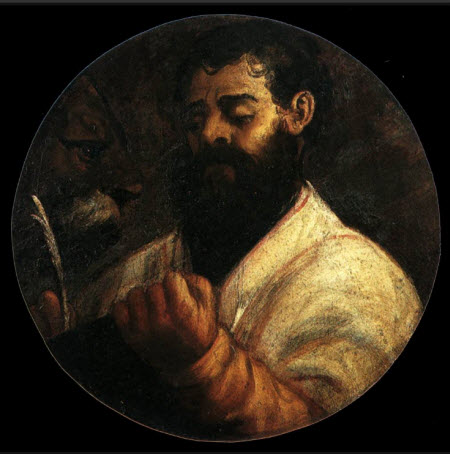As he went out of the temple, one of his disciples said to him, "Teacher, see what kind of stones and what kind of buildings!"
The Book of Mark
Mark 1:15 - And saying, The time is fulfilled, and the kingdom of God is at hand: repent ye, and believe the gospel.
Mark 2:12 - And immediately he arose, took up the bed, and went forth before them all; insomuch that they were all amazed, and glorified God, saying, We never saw it on this fashion.
Mark in The New Testament - A Brief Overview

Painting of St. Mark by Titian - 1560
Introduction to The Gospel of Mark
The Word Gospel. The second book of the English Bible that most of us read from is the Gospel of Mark. Mark is the second of the four gospel writings, yet there is only one gospel about Jesus Christ and there are four different writers: Matthew, Mark, Luke, and John. The word "Gospel" means "good news", and the good news is about Jesus Christ dying on the cross and then 3 days later conquering death and rising from the dead, offering salvation to all mankind, this is the Gospel.
Summary of The Book of Mark
Brief Summary. Jesus of Nazareth is the suffering servant who came to die for the sins of all men. He did His work and "immediately" went to the cross, so be encouraged all who are suffering because Christ suffered for you.
Purpose. The Book of Mark is the shortest of the 4 Gospel accounts of the life of Jesus Christ. and he seems to write his account of the Gospel of Christ with a sense of urgency. He mentions the word "immediately" 27 times. In Mark many times Jesus exercises actions rather than words, which would impress his Roman readers who the Book seems to be addressing. He portrays Jesus as a man of power and miracles, who could set aside the laws of nature at will. Yet this powerful Son of God was the suffering servant who would give up His life as a ransom for all mankind (Mark 10:45). The clear purpose of mark was to encourage those suffering persecution that their master suffered first, and He suffered for them.
Audience. Apparently Mark wrote his Gospel account to encourage gentile Christians in Rome who were facing the persecutions of the Emperor Nero. History is clear about the atrocious behavior of the Romans and especially the insanity of Nero. The other evidence that scholars bring up concerning mark's audience as being gentiles is the fact that Mark does not deal with Jewish Laws and he only quotes one prophecy from the Old Testament. There is also careful thought into explaining Jewish customs and idioms. (See Mark 3:7; 5:41; 7:2; 10:46; 14:36; 15:34; 9:43; 14:12; 15:42).
Authorship. The gospel of Mark does not proclaim who the author is within the document, yet the information that we know about Mark can be seen in the writer of this gospel. It is evident that the writer was Jewish, he was a Christian, and he was familiar with every day Jewish life, as well as the Jewish Scriptures. We know from the Scriptures that Mark was Jewish, and he knew the teachings of Jesus very well. He also knew the teachings of the rest of the apostles. It is also important to notice that after Peter was imprisoned he went to the house of Mary, the mother of Mark (Acts 12:12-17). Also Peter mentions in his epistle "my son Mark" (1 Peter 5:13). During Paul's missionary journeys Mark became a companion of Paul and Barnabas, and he left them at Perga in Pamphylia (Acts 13:13), after Paul had rebuked him. Many years later Mark regained the favor of Paul (Col. 4:10; 2 Tim. 4:11). Early Church tradition unanimously ascribes the second gospel to Mark as a companion of Peter and the writer of the second Gospel. One prologue to the Gospels which was written around 160 AD has this statement: "Mark� Was Peter's interpreter, and after Peter's decease wrote down this gospel in the region of Italy." Irenaeus, Clement of Alexandria and Tertullian also attest to Mark as the author.
Location. Nothing in the Gospel of Mark indicates where it was written from. Most of the early writers who boast of Mark as the author also name Rome as the place it was written.
Date. Early Christian writers and traditions place the Gospel of Mark sometime close to the end of Peter's life, around 60-65 AD. Most scholars agree that the Gospel of Mark was written before the destruction of Jerusalem in 70 AD, while the Second Temple in Jerusalem was still standing (Mark 13:1-2). Many scholars do not believe in the miracle of predictive prophecy and argue that the Gospel of Mark was written after the fall of Jerusalem, because of the accurate details of the events that Jesus spoke about. Mark's Gospel account seems to have been written as encouragement to the Christians who were facing the persecution of the Emperor Nero which took place in 64 AD.
Outline of the Book of Mark
The Servant Comes - Chapter 1:1-13
The Servant's Work - Chapters 1:14-13:37
The Servant's Death - Chapters 14:1-15:47
The Servant's Resurrection - Chapter 16:1-20

The Name Jesus In Ancient Hebrew Text
"Yeshua" in First Century Hebrew Text. This is how the name "Jesus"
would have been written in ancient Hebrew documents. The four letters or
consonants from right to left are Yod, Shin, Vav, Ayin (Y, SH, OO, A).
Jesus is the Greek name for the Hebrew name Joshua or Y'shua which means
"The LORD or Yahweh is Salvation".
Mark Resources
Outline of the Life of Jesus in Harmony
Simple Map of First Century Israel
Topographical Map of First Century Israel
Map of the Ministry of
Jesus
Map of the Roads in Ancient Israel
Map of the Roman Empire